Key takeaways:
- Workplace conflicts often stem from differing communication styles, competition for resources, and personal differences, highlighting the need for effective communication.
- Resolving conflicts is essential for maintaining team dynamics, fostering innovation, and building trust among team members.
- Understanding the legal framework and having clear grievance procedures can empower employees to address conflicts and promote open dialogue.
- Empathy, clear communication, and resilience are crucial lessons for effectively navigating and resolving workplace conflicts.
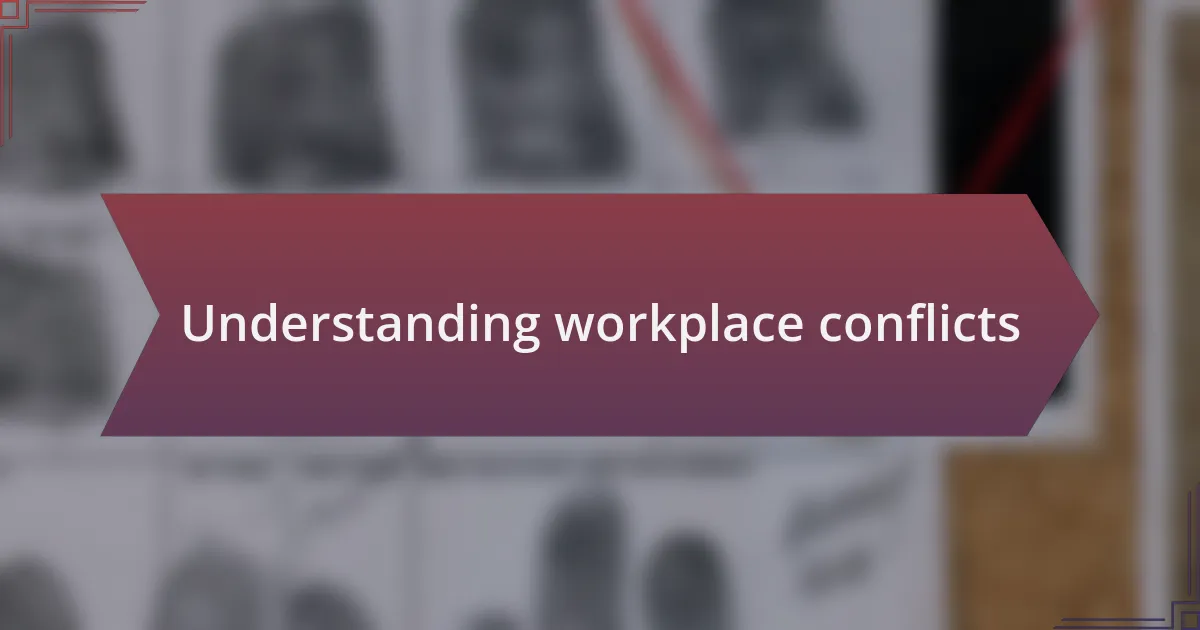
Understanding workplace conflicts
Workplace conflicts often arise from differences in opinions, values, or work styles. I remember a time when two team members clashed over project directions, which created a tense atmosphere. Have you ever found yourself caught in a disagreement with a colleague? It can feel like walking on eggshells.
Understanding the root cause of these conflicts is essential for resolution. I once dealt with a disagreement stemming from miscommunication rather than actual differences in perspective. Reflecting back, it made me realize how easily misunderstandings can spiral into larger issues, don’t you think?
Emotions play a crucial role in workplace dynamics. I’ve witnessed firsthand how frustration can boil over when team members feel unheard. Isn’t it interesting how a simple conversation can sometimes mend rifts and prevent conflicts from escalating further?
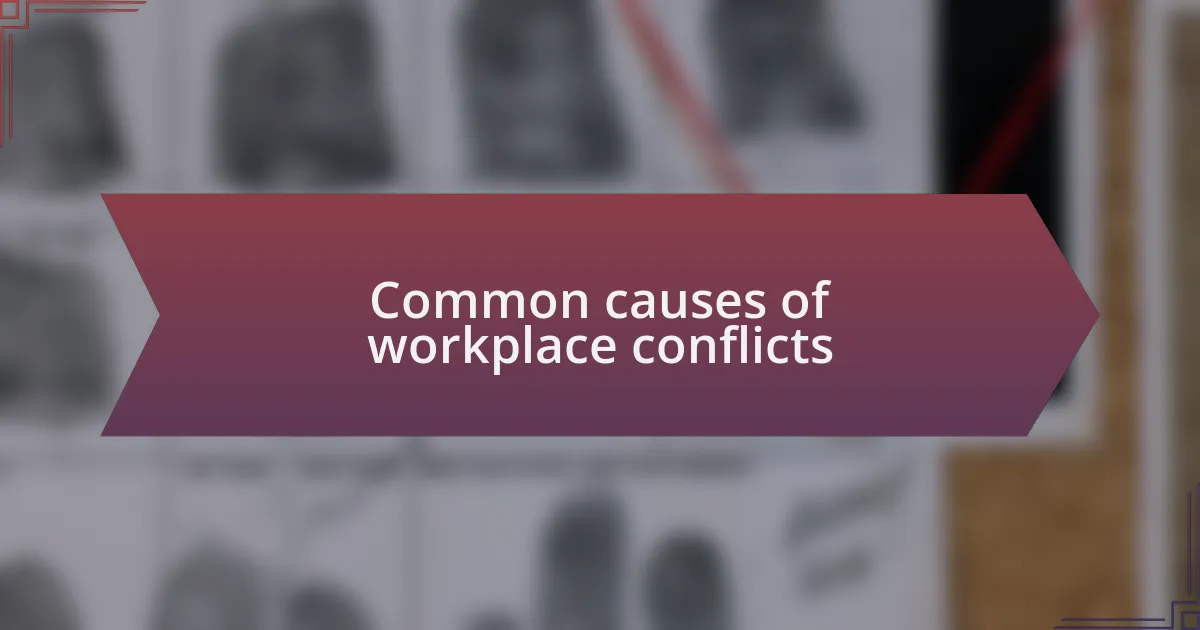
Common causes of workplace conflicts
When I reflect on my experiences, one of the most common causes of workplace conflicts I’ve seen is differing communication styles. For instance, I remember working with someone who preferred direct, blunt feedback, while I was more inclined to be diplomatic and gentle. It created an environment where each of us felt frustrated, as our messages often got lost in translation. Have you experienced something similar, where intentions were misunderstood?
Another frequent trigger is competition for resources or recognition. I once found myself in a situation where two departments were vying for the same budget. It felt like a battle rather than a collaboration, and the tension affected not just the teams involved but even those in adjacent departments. Isn’t it fascinating how a lack of shared goals can turn colleagues into rivals?
Additionally, personal differences can fuel conflicts, such as contrasting work ethics or values. I once teamed up with someone who was highly ambitious and driven, which clashed with my more laid-back approach to deadlines. This led to a project where neither of us felt totally satisfied, highlighting how our varying priorities can complicate teamwork. How do you navigate those moments when personal styles just don’t mesh?
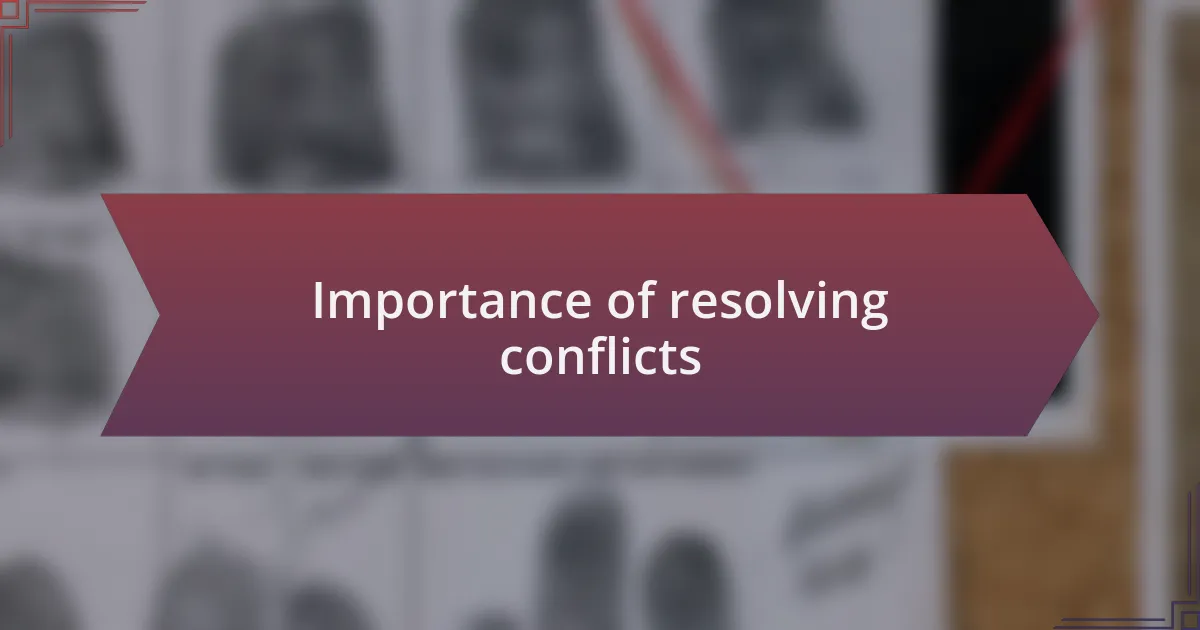
Importance of resolving conflicts
Resolving conflicts in the workplace is crucial for maintaining a healthy team dynamic. I recall a time when a disagreement between two colleagues escalated to the point where it disrupted our entire project timeline. Seeing the frustration on everyone’s faces made it clear: unresolved conflicts not only affect the individuals involved but also create a ripple effect that impacts overall productivity. Who hasn’t felt the tension when team members aren’t aligned?
Moreover, addressing conflicts head-on can lead to innovative solutions and stronger relationships. I remember a situation where a conflict arose over the direction of a project. Instead of letting it fester, we held a meeting to discuss our differing viewpoints. The outcome was unexpectedly positive—by blending our ideas, we created a proposal that exceeded our initial expectations. Isn’t it remarkable how constructive dialogue can turn a potential disaster into an opportunity for collaboration?
Finally, I believe that resolving workplace conflicts fosters a culture of trust and respect. When team members feel heard and valued, it encourages open communication. I’ve seen teams transform when conflicts are resolved; they become more cohesive and engaged. What if more workplaces prioritized conflict resolution as a key component of their culture? The benefits could be monumental.
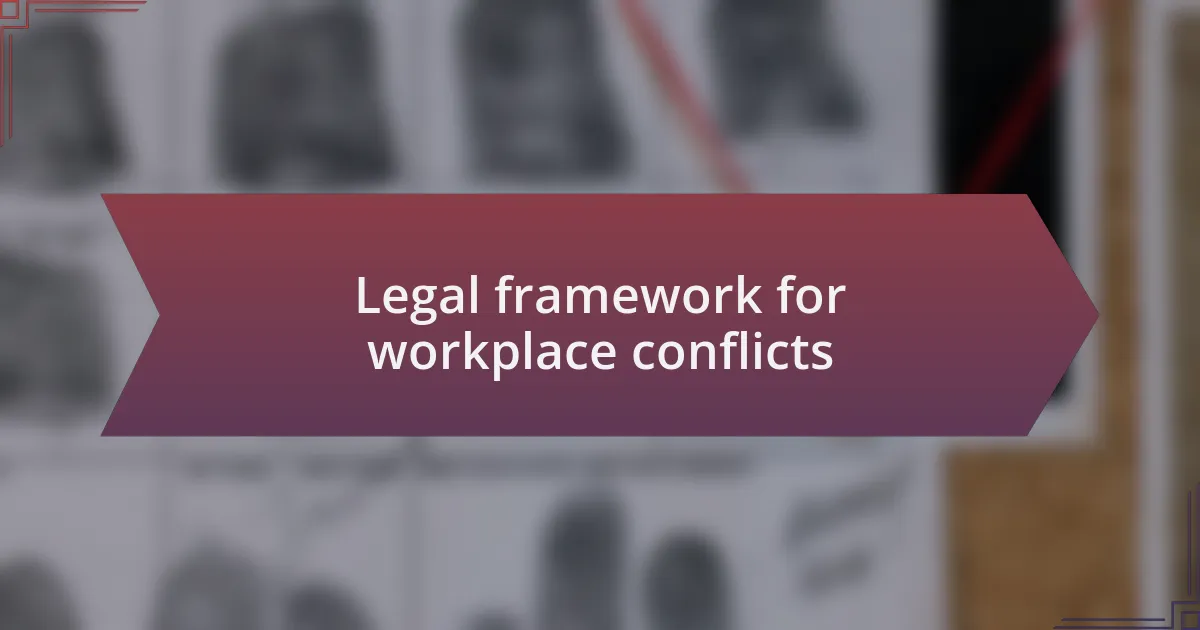
Legal framework for workplace conflicts
Understanding the legal framework for workplace conflicts is essential for resolving disputes effectively. Laws such as the National Labor Relations Act (NLRA) protect employees’ rights to engage in discussions about their work conditions, which can often serve as a basis for resolving conflicts. I’ve noticed that when conflicts arise, awareness of these legal protections can empower employees to voice their concerns, fostering an environment where dialogue is encouraged rather than stifled.
Moreover, anti-discrimination laws play a pivotal role in workplace conflicts. They aim to prevent biases based on race, gender, age, or disability. I once witnessed a situation where a colleague felt sidelined during a team project due to assumptions about their capabilities. Understanding these legal protections helped them approach the issue confidently, leading to a candid discussion that brought about a more inclusive decision-making process. Isn’t it empowering when individuals know their rights can guide them toward a resolution?
Lastly, employers are often encouraged, or required, to develop their own grievance procedures. I find that having a clear process helps mitigate potential conflicts before they escalate. When employees feel that there’s a structured approach to addressing issues, it promotes a sense of security. Wouldn’t it make a difference in workplace culture if everyone knew there was a straightforward path for resolving conflicts, backed by legal guidelines? It sure would.
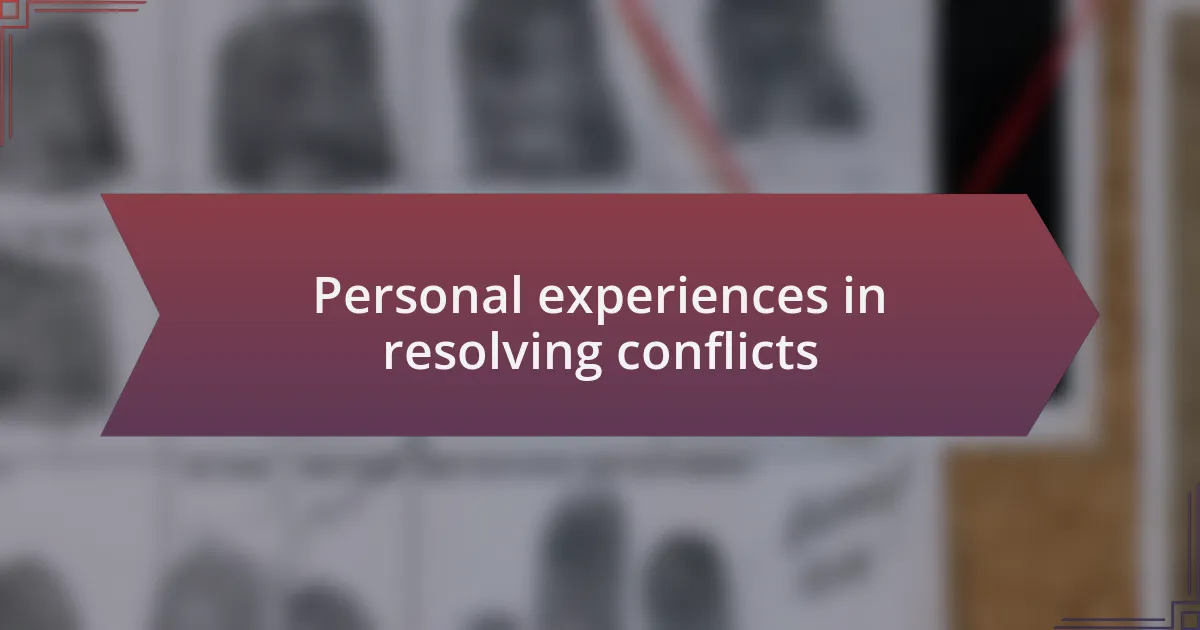
Personal experiences in resolving conflicts
During my time in a team project, I encountered a conflict that initially seemed insurmountable. I remember a colleague and I had differing opinions on our approach, and tension started to arise. Rather than letting the disagreement fester, I decided to invite her for a coffee chat where we could openly discuss our views. It was surprising how much clarity came from that simple conversation—sometimes, just sitting down and listening can bridge gaps that seem wide apart.
Another experience that stands out involves a misunderstanding between team members that spiraled into an awkward standoff. I felt the tension in the air and knew something had to be done. I took the initiative to organize a team meeting focused on rebuilding trust and encouraging open communication. It wasn’t easy, but fostering an environment where everyone felt safe to share their feelings made a significant difference. Have you ever seen a group dynamic shift after honest dialogue? It’s quite remarkable.
Lastly, I remember a situation when I had to mediate between two colleagues who were at odds over resource allocation. Seeing their frustration, I realized that sometimes conflicts stem from misaligned goals rather than personal grievances. I facilitated a discussion focused on aligning our objectives and surprisingly, that soon led to a collaborative solution. It’s moments like these that reinforce my belief: proactive communication is invaluable in turning potential confrontations into collaborative opportunities. Have you ever found yourself in a similar role?
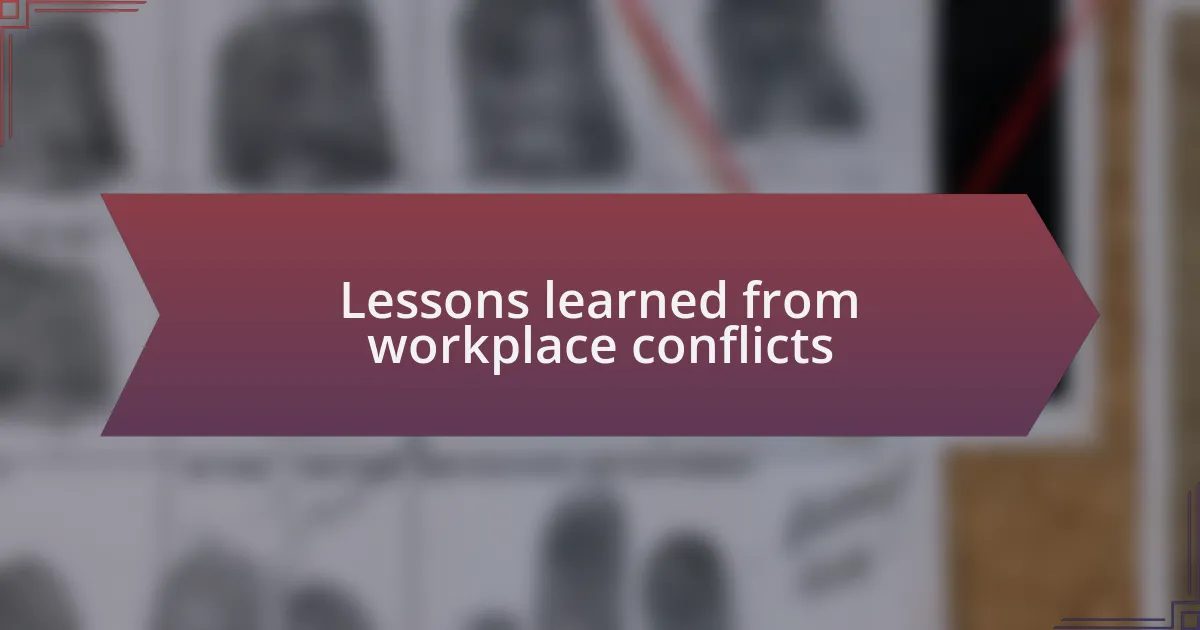
Lessons learned from workplace conflicts
Reflecting on my experiences, one key lesson from workplace conflicts is the value of empathy. I recall a time when a colleague seemed unresponsive during a project. Instead of labeling her as uncooperative, I reached out to understand her perspective. This small act of empathy transformed my frustration into support, enhancing not only our working relationship but also the project itself. Have you ever considered how a shift in perspective could change the outcome of a conflict?
Another important takeaway is the necessity of clear communication. During a particularly tense moment in a group project, misunderstandings were rampant, leading to misplaced blame and low morale. I took it upon myself to clarify roles and responsibilities during a team huddle, which alleviated much of the tension. This experience taught me that when everyone knows their individual contributions, reaching common ground becomes much easier. Isn’t it interesting how clarity can dissolve confusion?
Lastly, I’ve learned that resilience is crucial in navigating workplace conflicts. I once found myself in a situation where a team decision was met with resistance. Despite the pushback, I remained committed to the agreed-upon plan, encouraging my teammates to give it a fair chance. Gradually, as they started to see the benefits of our choices, their resistance faded, paving the way for smoother collaboration. Has there been a time when your persistence paid off in a challenging situation?